

Lagoon Hospital performs first metallic replacement of arm bone, joints. By Sola Ogundipe A team of surgeons from Lagoon Hospitals led by Dr.
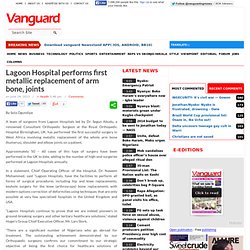
Segun Abudu, a renowned Consultant Orthopedic Surgeon at the Royal Orthopedic Hospital Birmingham, UK, has performed the first successful surgery in West Africa involving metallic replacement of the whole arm bone (humerus), shoulder and elbow joints on a patient. Approximately 50 – 60 cases of this type of surgery have been performed in the UK to date, adding to the number of high-end surgeries performed at Lagoon Hospitals annually. In a statement, Chief Operating Officer, of the Hospital, Dr. Naseem Mohammed, said “Lagoon Hospitals, have the facilities to perform all forms of surgical procedures including hip and knee replacements, keyhole surgery for the knee (arthroscopy) bone replacements with modern options correction of deformities using techniques that are only possible at very few specialised hospitals in the United Kingdom and USA.
“There are a significant number of Nigerians who go abroad for treatment. Researchers hijack cancer migration mechanism to 'move' brain tumors. One factor that makes glioblastoma cancers so difficult to treat is that malignant cells from the tumors spread throughout the brain by following nerve fibers and blood vessels to invade new locations.
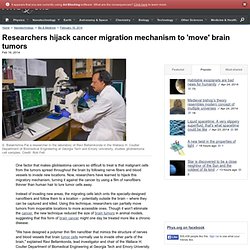
Now, researchers have learned to hijack this migratory mechanism, turning it against the cancer by using a film of nanofibers thinner than human hair to lure tumor cells away. Instead of invading new areas, the migrating cells latch onto the specially-designed nanofibers and follow them to a location – potentially outside the brain – where they can be captured and killed. Using this technique, researchers can partially move tumors from inoperable locations to more accessible ones. Though it won't eliminate the cancer, the new technique reduced the size of brain tumors in animal models, suggesting that this form of brain cancer might one day be treated more like a chronic disease. Details of the technique were reported February 16 in the journal Nature Materials.
Artificial blood made in Romania. First tests encouraging, researchers say. By Daniel Stroe – Bucharest A team of researchers of the Babes-Bolyai University in Cluj-Napoca, a city in NW Romania, has created a recipe for artificial blood whose preliminary tests have proven encouraging.
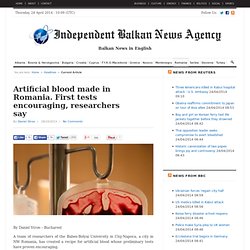
The team led by professor Radu Silaghi-Dumitrescu, who is only 39 years old, has been doing research to create the artificial blood for six years and their discovery could prove crucial given the lack of blood doctors need in cases of severe accidents and major surgeries. The blood is made of water, salt, albumin and a protein – hemerythrin -extracted from marine worms which makes the artificial blood stress resistant.
The researchers said the results of the first tests performed on mice are encouraging. „The mice treated with this type of blood ‘made in Cluj’ have remained indifferent and this is what we want, not to display signs of inflammation or disease. Living organ regeneration 'first' by gene manipulation. 8 April 2014Last updated at 07:08 ET By James Gallagher Health and science reporter, BBC News An elderly organ in a living animal has been regenerated into a youthful state for the first time, UK researchers say.
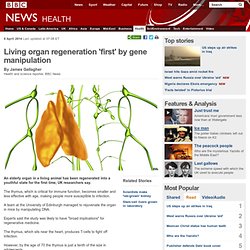
The thymus, which is critical for immune function, becomes smaller and less effective with age, making people more susceptible to infection. A team at the University of Edinburgh managed to rejuvenate the organ in mice by manipulating DNA. Experts said the study was likely to have "broad implications" for regenerative medicine. The thymus, which sits near the heart, produces T-cells to fight off infection.
Genetic switch controls body's tissue repair system. It is a sad fact that old age brings diseases.
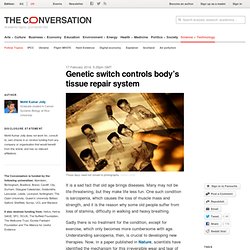
Many may not be life-threatening, but they make life less fun. One such condition is sarcopenia, which causes the loss of muscle mass and strength, and it is the reason why some old people suffer from loss of stamina, difficulty in walking and heavy breathing. Sadly there is no treatment for the condition, except for exercise, which only becomes more cumbersome with age.
Understanding sarcopenia, then, is crucial to developing new therapies. Now, in a paper published in Nature, scientists have identified the mechanism for this irreversible wear and tear of muscles as one ages. Our body is made of trillions of cells. Now researchers at Pompeu Fabra University, Bellvitge Biomedical Research Institute, and CNIC in Spain have deciphered how stem cells stop working, at least for those found in muscles. Normally senescence is useful. But how exactly do the cells undergo these changes?
OEM. Medical Device Regulations. Manufacturing.